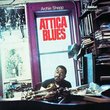| All Artists: Archie Shepp Title: Mama Too Tight (24bt) (Mlps) Members Wishing: 1 Total Copies: 0 Label: Universal Import Original Release Date: 1/1/2007 Re-Release Date: 7/23/2007 Album Type: Import, Limited Edition, Original recording remastered Genres: Jazz, Pop Style: Avant Garde & Free Jazz Number of Discs: 1 SwapaCD Credits: 1 UPC: 667341979022 |
Search - Archie Shepp :: Mama Too Tight (24bt) (Mlps)
 | Archie Shepp Mama Too Tight (24bt) (Mlps) Genres: Jazz, Pop
Japanese 24 Bit/96KHz remastered reissue of 1966 album originally issued on Impulse!, packaged in a limited edition miniature gatefold LP sleeve. 2001. |
CD DetailsSynopsis
Album Description Japanese 24 Bit/96KHz remastered reissue of 1966 album originally issued on Impulse!, packaged in a limited edition miniature gatefold LP sleeve. 2001. Similar CDs
|
CD ReviewsUnique and varied recording from Shepp. Michael Stack | North Chelmsford, MA USA | 03/30/2005 (4 out of 5 stars) ""Mama Too Tight" is an album whose original vinyl sides served as a proper division-- the first side is among the most difficult to digest, but like many of the more complex free jazz works, bears rewards with repeated listens, the second side is much more accessible, moving through moods on the three different tunes. What makes this record difficult is the odd instrumentation-- Shepp blows his tenor, and adds to this clarinet (Perry Robinson), trumpet (Tommy Turrentine), two trombones (Grachan Moncur III and Roswell Rudd), tuba (the mighty Howard Johnson, and a pianoless rhythm section (bassist Charlie Haden and drummer Beaver Harris). This unusual instrumentation is partially responsible for the difficulty in digesting the material on "Mama Too Tight". In particular, on the first side, "A Portrait of Rober Thompson (as a young man)". While it feels like free improv, there appears to be a highly concrete structure, as Shepp states, restates, and exposes various themes (mostly gospel, march and swing influenced) throughout the piece. But it is tough, because it feels at times like an incoherent mess. Patience is the key to this one-- early on, the more conventionally structured second side will be soothing in comparison. Over time, the piece will come to make sense, but patience and repeated focused listening will be required. The second side is definitely more conventional, "Mama Too Tight" is a funky blowout, Mingus-like in its voicing and gospel-tinged hard bop styling, with some stunning soloing on the part of all the musicians involved. Like Mingus' gospel-oriented work, this is just a lot of fun, a great great song, and actually is one of the most straightforward pieces on any early Shepp record-- only his solo shows any real signs of the "Fire Music" sound. The ballad, "Theme for Ernie", played passionately by Shepp with brass support voiced in an orchestral fashion, shwocases the leader's ability to invoke mood and emotion through his playing. Shepp's tone is thin and airy and has a plea of pain in it-- this is really among the most beautiful work he's ever done. "Basheer", continuing the thread of more conventional sounds, has a big band does the blues feel to it-- the playing is somewhat more "out" than the previous two, and once again, Shepp just wails away. its a really interesting piece. Overall, this is a really great album, and probably a good jumping in point for Shepp's work-- it can be a bit difficult at first, but there's a lot of great material here and its well worth the listen." Free but Funky directions | Space Time Foam | 10/21/2005 (5 out of 5 stars) "This is free jazz but real free jazz, not aimless improv. Basically you get classic Coltrane style free jazz combined with Horace Silver style soul jazz. This is jazz that takes chances but is not afraid to swing. During the middle of the first piece, in the midst of a free jazz storm, the band suddenly breaks into King Cotton. This is a statement about the emerging civil rights/black power movement and the origins of jazz without going into arch and obvious statements like Shepp's later Poem for Malcolm. And with an (at least to a person knowledgable about jazz)all star line up including the legendary Grachan Moncur III and Charlie Haden from Ornette Coleman's band what is not to enjoy?" Theme For Ernie a listener | pacific northwest | 01/22/2003 (5 out of 5 stars) "sorry 'A Customer - June 2, 1999' but that song was written by Philadelphian Fred Lacey, in memory of NY alto saxophonist Ernest Albert Henry, who died aged 31 on December 29, 1957. This beautiful ballad has been recorded many times by jazz artists, e.g. John Coltrane's version on his February 1958 Soultrane session.
as already mentioned above, there is a lot of demanding music on Mama Too Tight, perhaps not the best Archie Shepp for beginners -- try Four for Trane or Fire Music first. Duke Ellington's "Prelude To A Kiss" is beautifully interpolated during a portion of track 1, though. Shepp's octet group recorded here is unsurpassed, with Howard Johnson (of Taj Mahal fame) on tuba, trumpeter Tommy Turrentine (Stanley's brother), the dual trombonists Grachan Moncur III and Roswell Rudd (check out his own Impulse album Everywhere, available domestically on the Mixed CD -- one of the greatest free-jazz sessions of all time, including the Haden/Harris rhythm team), clarinetist Perry Robinson and a rock-solid rhythm section of Charlie Haden, bass and Beaver Harris, drums. Mr. Shepp's own liner notes acknowledge the album to be "at once a tribute to a woman of paramount virtue and [RE: tracks 1, 3, and 4] an eulogy for others. (Ernie Henry, Robert Thompson, and Basheer were three Black artists who passed away at painfully abortive ages.)"" |

 Track Listings (4) - Disc #1
Track Listings (4) - Disc #1
